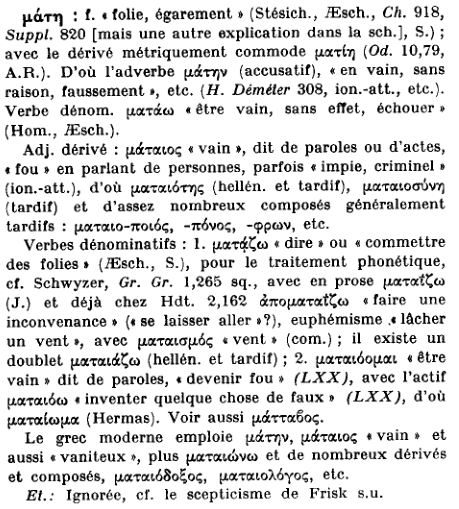Thursday, July 15, 2021
An Unseemly Gesture?
Herodotus 2.162.3 (tr. A.D. Godley):
Alan B. Lloyd, Herodotus, Book II, Commentary 99-182 (Leiden: E.J. Brill, 1993), pp. 176-177: N.G. Wilson, Herodotea: Studies on the Text of Herodotus (Oxford: Oxford University Press, 2015), p. 45: Favorino di Arelate, Opere. Introduzione, Testo Critico e Commento a cura di Adelmo Barigazzi (Florence: Felice Le Monnier, 1966), pp. 159-160 (fragment 15): My translation of Favorinus, fragment 15 Barigazzi:
On the root of ἀποματαΐζω see Pierre Chantraine, Dictionnaire étymologique de la langue grecque, III (Paris: Klincksieck, 1974), p. 672 (s.v. μάτη):
Newer› ‹Older
When Apries heard of it, he sent against Amasis an esteemed Egyptian named Patarbemis, one of his own court, instructing him to take the rebel alive and bring him into his presence. Patarbemis came, and summoned Amasis, who lifted his leg with an unseemly gesture (being then on horseback) and bade the messenger take that token back to Apries.J. Enoch Powell, A Lexicon to Herodotus (Cambridge: At the University Press, 1938), p. 41, renders ἀποματαΐζω as "break wind". Similarly Franco Montanari, The Brill Dictionary of Ancient Greek (Leiden: Brill, 2015), p. 260, s.v. ἀποματαΐζω: "to break wind (euphem. for ἀποπέρδω)". Cf. The Cambridge Greek Lexicon, Vol. I: A-I (Cambridge: Cambridge University Press, 2021), p. 190, s.v. ἀποματαΐζω: "respond in an insulting way (app. w. a fart)".
πυθόμενος δὲ ταῦτα ὁ Ἀπρίης ἔπεμπε ἐπ᾽ Ἄμασιν ἄνδρα δόκιμον τῶν περὶ ἑωυτὸν Αἰγυπτίων, τῷ οὔνομα ἦν Πατάρβημις, ἐντειλάμενος αὐτῷ ζῶντα Ἄμασιν ἀγαγεῖν παρ᾽ ἑωυτόν. ὡς δὲ ἀπικόμενος τὸν Ἄμασιν ἐκάλεε ὁ Πατάρβημις, ὁ Ἄμασις, ἔτυχε γὰρ ἐπ᾽ ἵππου κατήμενος, ἐπάρας ἀπεματάϊσε, καὶ τοῦτό μιν ἐκέλευε Ἀπρίῃ ἀπάγειν.
Alan B. Lloyd, Herodotus, Book II, Commentary 99-182 (Leiden: E.J. Brill, 1993), pp. 176-177: N.G. Wilson, Herodotea: Studies on the Text of Herodotus (Oxford: Oxford University Press, 2015), p. 45: Favorino di Arelate, Opere. Introduzione, Testo Critico e Commento a cura di Adelmo Barigazzi (Florence: Felice Le Monnier, 1966), pp. 159-160 (fragment 15): My translation of Favorinus, fragment 15 Barigazzi:
A man from Boeotia, seventy years old, happening upon a treasure, lifted his leg, farted, and passed by, as if it no longer meant anything to him. So it is that old age puts an end at the same time to both avarice and curiosity.Text and translation of the fragment of Favorinus can also be found in Denis M. Searby, The Corpus Parisinum. A Critical Edition of the Greek Text with Commentary and English Translation. A Medieval Anthology of Greek Texts from the Pre-Socratics to the Church Fathers, 600 B.C. - 700 A.D. (Lewiston: The Edwin Mellen Press, 2007), pp. 288 and 671.
Ὁ Βοιωτὸς ἐντυχὼν θησαυρῷ µετὰ ἑβδοµήκοντα ἔτη ἐπάρας τὸ σκέλος ἀπεµατάισε καὶ παρῆλθεν, ὡς οὐκέτι οὐδὲν ὄντα πρὸς αὐτόν. ὥστε καὶ πολυχρηματίας ἅµα παύει τὸ γῆρας καὶ πολυπραγµοσύνης.
On the root of ἀποματαΐζω see Pierre Chantraine, Dictionnaire étymologique de la langue grecque, III (Paris: Klincksieck, 1974), p. 672 (s.v. μάτη):
Labels: noctes scatologicae




